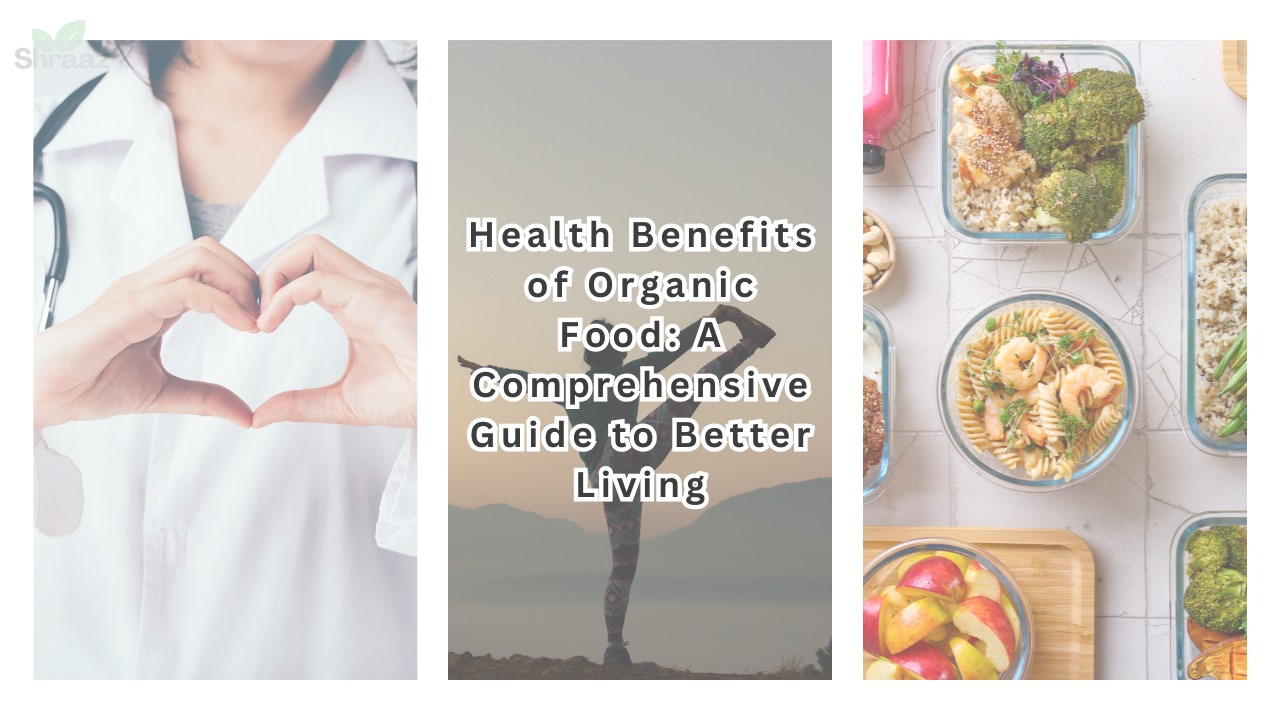What are the Health Benefits of Organic Food
As consumers become more health conscious and environmentally aware, organic food has grown in popularity and has been praised for its perceived health benefits and environmental sustainability.
But how exactly does organic food benefit your health? This comprehensive guide will explore the science-backed benefits of organic food, from its nutritional advantages to its impact on chronic disease prevention and mental well-being.
For a broader discussion of the overall distinctions between organic food beyond just health, check out our Complete Guide on the Differences Between Organic and Inorganic Food.
Nutritional Advantages of Organic Food
When it comes to nutrition, organic food offers some distinct benefits over conventionally grown food. Several studies have examined the nutrient composition of organic foods compared to conventional alternatives, showing promising differences in some key nutrients.
1. Higher Nutrient Density
One of the most widely cited reasons for choosing organic food is its potential for higher nutrient content. Organic fruits, vegetables, and grains are often found to contain more vitamins, minerals, and antioxidants than their conventional counterparts.
Key Nutrients Found in Higher Concentrations in Organic Foods:
- Vitamin C: Organic fruits like strawberries and oranges have been found to have higher levels of Vitamin C, essential for immune function and skin health.
- Antioxidants: A meta-analysis published in the British Journal of Nutrition found that antioxidant levels in organic crops are significantly higher (18-69% more) compared to conventional crops. Antioxidants are crucial for protecting cells from oxidative stress, potentially lowering the risk of chronic diseases like cancer.
- Polyphenols: These bioactive compounds, found in higher amounts in organic fruits and vegetables, are known for their anti-inflammatory and anti-carcinogenic properties.
The reason for this higher nutrient density may lie in the soil. Organic farming practices promote healthier soil by using natural fertilizers and crop rotation, which can boost the availability of essential nutrients in the plants.
2. Fewer Additives and Preservatives
Unlike conventionally produced food, organic food avoids artificial additives and preservatives, which are commonly used to extend shelf life and enhance flavor in processed foods. Avoiding these chemicals may not only lead to a purer product but also minimize potential health risks associated with their consumption, such as allergies, hyperactivity in children, and metabolic disruption.
Organic Certification Standards:
- No artificial food colorings or flavorings
- No synthetic preservatives
- No irradiation to sterilize the product
3. Better Fat Composition in Organic Animal Products
Organic animal products, such as meat, eggs, and dairy, also show nutritional differences compared to conventionally raised animals, particularly in their fat content.
- Omega-3 Fatty Acids: Organic milk and meat contain about 50% more beneficial omega-3 fatty acids than conventionally produced options, according to a 2016 study in the British Journal of Nutrition. Omega-3s are crucial for heart health, brain function, and reducing inflammation.
This difference is largely due to the organic animals’ diets, which are more pasture-based and less reliant on processed grain feed, which can alter the fatty acid composition of their products.
4. Fewer Pesticide Residues
Perhaps one of the most significant advantages of organic food is the drastically lower levels of pesticide residues. Pesticides, often used in conventional farming to protect crops, have been linked to a variety of health issues, particularly with long-term exposure.
- A study published by the Environmental Working Group (EWG) revealed that people who eat organic food are exposed to 80% fewer pesticides compared to those consuming conventional produce.
This reduction in pesticide intake is critical, as even small amounts of these chemicals have been associated with health risks, including neurological and developmental issues, hormone disruption, and an increased risk of certain cancers.
Reduced Exposure to Harmful Chemicals
Organic food offers more than just nutritional benefits; it significantly reduces your exposure to harmful chemicals. This is especially relevant given the increasing body of research connecting chemical exposure in conventional food to long-term health issues.
1. Avoidance of Synthetic Pesticides and Herbicides
Synthetic pesticides are a cornerstone of conventional agriculture, used to protect crops from pests and diseases. While they may boost crop yield, their presence in food comes at a health cost. Many pesticides used in conventional farming have been linked to serious health conditions:
- Health Risks: Studies have associated pesticide exposure with cancer, hormonal disruption, neurodevelopmental disorders, and respiratory diseases.
- Vulnerable Populations: Children and pregnant women are particularly susceptible to the harmful effects of pesticide exposure. Research suggests that prenatal exposure to pesticides can lead to developmental delays, lower IQ, and even birth defects.
By choosing organic food, consumers reduce their risk of these issues. Organic farming uses natural alternatives like crop rotation, biological pest control, and organic fertilizers to manage pests and diseases without synthetic chemicals.
Studies on Pesticide Exposure:
- The European Parliament Report (2017): Found that people who consumed organic foods had significantly lower levels of pesticide residues in their bodies.
- The Journal of Environmental Research: Reported that switching to an organic diet for just one week reduced pesticide levels in urine by 89%.
2. Free from Genetically Modified Organisms (GMOs)
Organic foods are guaranteed to be free of genetically modified organisms (GMOs), which are plants or animals whose DNA has been artificially altered in a laboratory. While the long-term health effects of GMOs are still being studied, there are concerns over potential allergenicity, antibiotic resistance, and environmental damage linked to their use.
Why Organic Means GMO-Free:
- Certification Requirements: Organic certification prohibits the use of GMOs in both crops and animal feed, ensuring that organic products are free from these controversial organisms.
- Public Concerns: Many consumers choose organic foods to avoid the unknown risks of consuming GMOs, especially given the concerns about biodiversity loss and the potential for cross-contamination in conventional farming.
3. Avoidance of Antibiotics and Hormones
Conventional animal farming practices often rely heavily on antibiotics and hormones to promote growth and prevent disease in densely populated animal environments. However, this practice has raised concerns over:
- Antibiotic Resistance: Overuse of antibiotics in livestock can contribute to the development of antibiotic-resistant bacteria, which pose a significant public health risk. According to the World Health Organization (WHO), antibiotic resistance is one of the greatest threats to global health, food security, and development today.
- Hormonal Imbalances: Hormones used to promote rapid growth in livestock have been linked to hormonal imbalances in humans, which can contribute to early puberty in children and increase the risk of cancers like breast and prostate cancer.
In contrast, organic farming prohibits the use of synthetic hormones and antibiotics, meaning organic animal products come with a lower risk of contributing to these health issues.
Organic Food and Chronic Disease Prevention
One of the most significant long-term benefits of consuming organic food is its potential to reduce the risk of chronic diseases. Research increasingly shows that diets rich in organic foods may play a role in preventing conditions such as cancer, heart disease, and diabetes. This section explores how organic food impacts disease prevention.
1. Lower Risk of Certain Cancers
There is growing evidence that consuming organic food may reduce the risk of certain types of cancers. Pesticides and chemical residues found in conventionally grown food have been linked to an increased risk of cancer over time. Organic foods, with their lower levels of synthetic chemicals, offer a cleaner alternative.
- Study Findings: A large study published in JAMA Internal Medicine in 2018 found that people who regularly consumed organic food had a 25% lower risk of developing cancer compared to those who ate conventionally grown foods. The reduction in cancer risk was particularly significant for non-Hodgkin’s lymphoma and postmenopausal breast cancer.
- Mechanisms: Pesticides like glyphosate and atrazine, commonly used in conventional farming, are classified as probable carcinogens by the International Agency for Research on Cancer (IARC). Avoiding these substances through organic food consumption could lower cancer risk.
2. Heart Health
Heart disease remains the leading cause of death worldwide, and diet plays a critical role in cardiovascular health. Organic foods can positively influence heart health through several mechanisms:
- Omega-3 Fatty Acids: As mentioned earlier, organic meat and dairy products contain higher levels of omega-3 fatty acids, which are beneficial for heart health. These fatty acids help reduce inflammation, lower blood pressure and prevent the formation of blood clots.
- Reduced Exposure to Harmful Chemicals: Pesticide exposure has been linked to heart-related conditions such as atherosclerosis (hardening of the arteries) and hypertension. Choosing organic foods reduces the intake of harmful pesticides, potentially lowering the risk of heart disease.
3. Diabetes and Blood Sugar Regulation
Organic foods, especially fruits and vegetables, contain higher levels of antioxidants and polyphenols, which can help regulate blood sugar levels and improve insulin sensitivity. These bioactive compounds may help reduce the risk of type 2 diabetes.
- Antioxidants: Higher concentrations of antioxidants in organic food can reduce oxidative stress, a key factor in the development of insulin resistance.
- Polyphenols: Studies have shown that polyphenols, which are more abundant in organic crops, can modulate carbohydrate metabolism and improve glucose homeostasis, offering protective benefits against diabetes.
4. Anti-Inflammatory Effects
Chronic inflammation is a contributing factor to many diseases, including arthritis, heart disease, and even Alzheimer’s disease. Organic foods are rich in anti-inflammatory compounds, which may help reduce inflammation in the body.
- Higher Antioxidant Levels: Organic fruits and vegetables, which contain more antioxidants like flavonoids and carotenoids, can help neutralize free radicals, molecules that contribute to inflammation and chronic disease.
- Absence of Synthetic Chemicals: The chemicals and additives used in conventional food production have been associated with increased inflammatory markers in the body. Organic foods, which avoid these substances, may help lower inflammation over time.
Impact on Children and Vulnerable Populations
Children, pregnant women, and the elderly are particularly vulnerable to the health risks associated with pesticide and chemical exposure in conventional food. Organic food, free from these harmful substances, offers an important health advantage for these groups.
1. Organic Food for Children
Children are more susceptible to the harmful effects of pesticides and other chemicals due to their smaller size, developing organs, and higher food intake relative to their body weight. Studies have shown that organic diets can significantly reduce children’s exposure to pesticides, which may improve developmental outcomes.
- Reduced Pesticide Exposure: A study in the Environmental Health Perspectives Journal found that children who consumed organic foods had significantly lower pesticide levels in their urine compared to those who ate conventionally grown foods.
- Developmental Benefits: There is evidence that prenatal exposure to pesticides can negatively affect brain development, leading to lower IQ, attention deficit disorders, and other cognitive issues. Organic food, which is free from these chemicals, provides a safer option for pregnant women and young children.
2. Benefits for Pregnant Women
During pregnancy, diet plays a crucial role in both maternal and fetal health. Exposure to harmful chemicals, especially during critical periods of fetal development, can have long-term effects on the baby’s health.
- Fetal Development: Pesticides in conventional food have been linked to developmental delays, preterm birth, and low birth weight. A study in JAMA Pediatrics found that women who consumed more organic produce during pregnancy had lower rates of birth defects and complications compared to those who ate conventional foods.
- Hormonal Disruption: Many pesticides and synthetic chemicals act as endocrine disruptors, which can interfere with hormone regulation during pregnancy. Consuming organic food can reduce the risk of hormonal imbalances that may affect both the mother and the developing fetus.
3. Impact on the Elderly
As people age, they become more vulnerable to the negative effects of toxins and chemicals found in conventional food. The immune system weakens with age, making it more difficult for the body to detoxify harmful substances. Organic food, which reduces exposure to pesticides and other harmful chemicals, can support better health in older adults.
- Immune Support: The antioxidants and nutrients found in higher concentrations in organic food can help support the immune system and protect against age-related diseases.
- Cognitive Health: Research has suggested that organic food may play a role in preserving cognitive function in older adults by reducing inflammation and oxidative stress, both of which are linked to cognitive decline and dementia.
Mental Health and Organic Diets
The link between diet and mental health is becoming increasingly apparent, with new studies suggesting that what we eat can have a profound impact on our mood and cognitive function. Organic foods, being free from neurotoxic chemicals and rich in essential nutrients, may support better mental health.
1. Reduced Exposure to Neurotoxins
Many pesticides used in conventional farming are classified as neurotoxins, which can affect brain function and contribute to mental health disorders such as anxiety, depression, and cognitive decline. Organic foods, which are free from these substances, offer a safer alternative.
- Impact of Pesticides on the Brain: Research published in the Journal of Occupational and Environmental Medicine suggests that chronic exposure to pesticides may be linked to an increased risk of depression and other mental health issues. By opting for organic food, individuals can avoid these neurotoxic compounds.
2. Nutrient-dense foods for Brain Health
Nutrient-dense organic foods, particularly those rich in antioxidants, omega-3 fatty acids, and vitamins, can have a positive effect on brain health. These nutrients play a crucial role in maintaining cognitive function and supporting mental well-being.
- Antioxidants: Organic fruits and vegetables, which contain higher levels of antioxidants, help reduce oxidative stress in the brain, protecting against neurodegenerative diseases such as Alzheimer’s and Parkinson’s.
- Omega-3s: Organic animal products, which are higher in omega-3 fatty acids, have been shown to support brain health by reducing inflammation and promoting neurogenesis (the growth of new brain cells).
3. Gut-Brain Axis and Organic Food
The gut-brain axis refers to the bidirectional communication between the gastrointestinal system and the brain. A healthy gut microbiome is crucial for mental health, and organic food may play a role in maintaining this balance.
- Avoidance of Antibiotics in Organic Meat: The absence of antibiotics in organic animal products helps protect the gut microbiome, which can positively impact mental health by reducing inflammation and improving the body’s ability to produce neurotransmitters like serotonin.
Environmental Health and Its Indirect Impact on Human Health
The environmental benefits of organic farming are well-documented, and these advantages also have indirect but important impacts on human health. Organic farming practices prioritize sustainability, reduce pollution, and promote biodiversity, all of which contribute to cleaner, healthier environments that support public health.
1. Organic Farming and Soil Health
Healthy soil is the foundation of a healthy food system, and organic farming practices improve soil quality by avoiding synthetic fertilizers and pesticides. Organic farms use crop rotation, composting, and other sustainable practices that increase soil biodiversity and fertility.
- Healthier Food: Healthier soil produces more nutrient-dense food, providing higher levels of vitamins, minerals, and antioxidants that are essential for human health.
- Reducing Environmental Contaminants: Organic farming reduces contamination of water supplies by avoiding harmful chemicals, which can seep into groundwater and pose a risk to human health.
2. Impact on Biodiversity
Organic farming supports biodiversity, both on the farm and in surrounding ecosystems. Conventional farming practices, which rely heavily on monoculture and chemical inputs, can harm biodiversity, leading to the loss of beneficial species like pollinators and soil microbes.
- Human Health Benefits: Biodiversity is crucial for a stable food supply and ecosystem. By supporting pollinators like bees, organic farming ensures that essential crops are available, reducing food insecurity and promoting health.
3. Reducing Climate Change
Organic farming is also part of the solution to climate change, as it reduces greenhouse gas emissions and enhances carbon sequestration in the soil. Climate change has direct health impacts, including respiratory problems, heat-related illnesses, and the spread of infectious diseases.
- Healthier Communities: By reducing its carbon footprint, organic farming helps mitigate climate-related health issues, contributing to healthier environments and communities.
Challenges and Considerations in Organic Food Consumption
While organic food offers numerous health benefits, there are challenges that consumers must consider when making the switch to an organic diet. These include price, availability, and the fact that not all organic foods are automatically healthier.
1. Price and Accessibility
Organic food is often more expensive than conventionally grown food, which can make it difficult for some people to afford. This is due to several factors, including more labor-intensive farming practices and smaller yields.
2. Organic Processed Foods
Not all organic foods are equally healthy. Organic certification applies to farming practices, not the nutritional value of the food itself. Organic processed foods, such as chips or cookies, can still be high in sugar, fat, and salt, even though they are free from synthetic pesticides and additives.
3. Limited Availability
In some areas, particularly rural or low-income regions, access to organic food can be limited. Conventional produce may be more readily available and more affordable, which can make it challenging for consumers to prioritize organic choices. The lack of accessibility to organic food may widen health disparities, as lower-income populations are often more exposed to the risks associated with pesticide consumption.
4. Misconceptions about Organic Food
There is a common misconception that “organic” automatically means “healthy.” While organic food is free from synthetic chemicals and GMOs, it’s important to remember that organic junk food is still junk food. Organic cookies, chips, and other highly processed snacks may contain organic ingredients but are often just as high in calories, sugar, and unhealthy fats as their conventional counterparts. Consumers should remain mindful of their overall diet quality, focusing on whole, nutrient-dense organic foods rather than processed alternatives.
5. Organic Certification and Labels
Understanding organic labels can sometimes be confusing for consumers. Not all food labeled “organic” adheres to the same standards, and there are different levels of certification:
- 100% Organic: All ingredients are certified organic.
- Organic: At least 95% of the ingredients are certified organic.
- Made with Organic Ingredients: At least 70% of the ingredients are certified organic, but the food may still contain non-organic ingredients.
Consumers need to be aware of these distinctions when shopping for organic products to ensure they are making informed choices that align with their health goals.
Conclusion
Organic food provides numerous health benefits, from higher nutrient density and reduced exposure to harmful chemicals to chronic disease prevention and improved mental health. Organic farming practices also offer significant environmental benefits, contributing to cleaner water, healthier soil, and biodiversity, all of which indirectly enhance human health.
Although the price and availability of organic food can be barriers for some, the growing body of research highlights the tangible health advantages of choosing organic, especially for vulnerable populations like children, pregnant women, and the elderly. As more consumers prioritize health and sustainability, demand for organic food continues to rise, driving both innovation and accessibility in the organic food market.
For individuals and families looking to reduce their exposure to harmful chemicals and invest in long-term health, choosing organic food, especially for produce, dairy, and meat, can be a worthwhile step. While not all organic foods are inherently healthy, focusing on whole, unprocessed organic foods can help maximize the health benefits.




